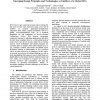1512 search results - page 17 / 303 » Principles of IEEE 802.11s |
TPHOL
2008
IEEE
14 years 1 months ago
2008
IEEE
When reasoning about inductively defined predicates, such as typing judgements or reduction relations, proofs are often done by inversion, that is by a case analysis on the last r...
IEEESCC
2007
IEEE
14 years 1 months ago
2007
IEEE
Web Services have experienced great interest during the last years as they were expected to play a key role as enablers of seamless application-to-application integration both wit...
GLVLSI
2006
IEEE
14 years 1 months ago
2006
IEEE
As CMOS devices and operating voltages are scaled down, noise and defective devices will impact the reliability of digital circuits. Probabilistic computing compatible with CMOS o...
NCA
2006
IEEE
14 years 1 months ago
2006
IEEE
Gossip protocols provide probabilistic reliability and scalability, but their inherent randomness may lead to high variation in number of messages that are received at different n...
CVPR
2010
IEEE
14 years 1 months ago
2010
IEEE
The accuracy of optical flow estimation algorithms has been improving steadily as evidenced by results on the Middlebury optical flow benchmark. The typical formulation, however...

